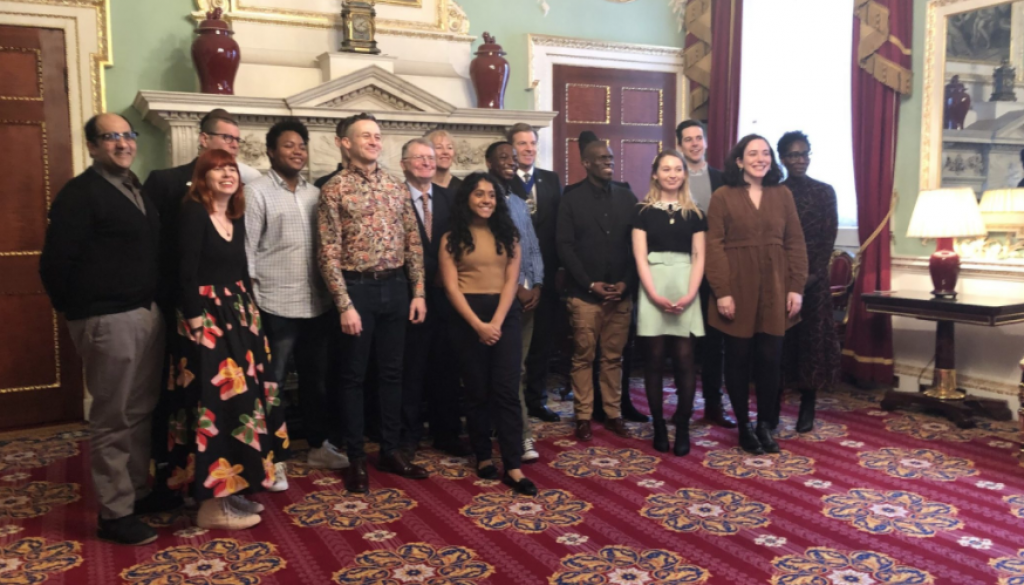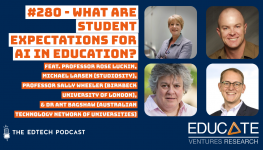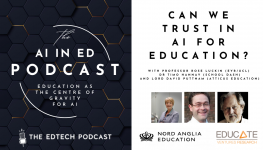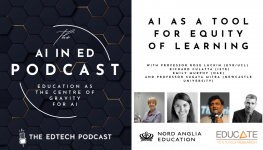An adventure in social & inclusive virtual reality

A guest blog post for The Edtech Podcast, by Ian Hurd, Creative Practitioner & Digital Learning Consultant and Reporter and Presenter for The Edtech Podcast | Twitter: @Ian_R_Hurd
After graduating with my MA in Education & Technology at UCL, way back in 2018, I was itching to develop a programme that combined my interests in 21st Century skills, project-based learning and creative thinking, using technology in a pragmatic way to help people develop or upskill to be future-ready, life-long learners. I sketched out a bunch of designs for a local service agency to digitise their training for charities, whilst simultaneously training employees and volunteers in various creative media production formats, which is my field as a Further Education lecturer and Senior Moderator for UAL Awarding Body. As you can imagine, pre-Covid, this was a slow process due to a lack of funds, time and impetus, so I kept the idea on the backburner, tweaking it from time to time.
In the summer of 2019, the delightful Sophie Bailey at The Edtech Podcast asked if I would like to step in to chair a discussion at the Creativity Schools Symposium at Stratford Circus in November 2019. The event was a collection of talks designed to engage educators in the locale as part of the East Education Framework, aimed at supporting schools to embed creativity across the curriculum, with a view to helping young people enter the burgeoning creative and digital economy as a result of the East Bank Development. It was at this event that I met a representative of Culture Mile, who told me about the Fusion Prize, an initiative they had partnered on with the Foundation for Future London, seeking innovative ideas that help young Londoners develop Fusion Skills (a combination of transferable/soft skills and technical/hard skills) through creative and cultural experiences. Clearly, I was very excited and set about writing my proposal, though I needed to have a registered business to be eligible. This coincided with some consultation I had been doing for a VR education project that Atif Ghani, at HyperActive Developments Ltd. (also finalist in the new XR section of the London Film Festival 2020, with The Martha Street Experience), was developing for UCL’s EDUCATE programme, where we met at a networking event for graduate and start-ups. Thankfully, Atif was up for it and we set about constructing the proposal and gathering a team of practitioners for the initial idea, based on combining creative media skills to support local charities or social enterprises, in line with participant’s personal interests. The formative assessment strategy was centred around a blended, project-based learning programme which referenced OCED PISA frameworks, based on decades of research, for a range of transferable skills (Creative Thinking, Collaborative Problem-Solving, Communication and Critical Thinking) and resulting in the creation of an open toolkit that schools and not-for-profit training providers could use and adapt for programme iterations, hopefully with our support.
The initial submission was in January 2020 and we were chosen as one of six finalists and given £1000 to develop the idea, to be pitched in April…though of course this was postponed due to the pandemic, which turned out to be a boon, given the superb array of support from Culture Mile (hats off to Rosemara Mather-Lupton and team!). As a result of the pandemic, we decided to pivot and reversion the Nexus concept so that it could be delivered wholly-online in a way that also maximised equitable access and inclusion, so an asynchronous delivery methodology was also adopted. We had also been experimenting with Social VR to foster remote collaboration, using platforms such as AltspaceVR and Mozilla Hubs and decided to utilise Mozilla due to the flexibility afforded by the cross-platform WebXR approach, which meant we could reduce both logistical, financial and technical issues that can prohibit social VR collaboration. To access our rooms in Mozilla Hubs, participants can use smartphones, tablets or PCs, where they can meet with fellow participants from different Boroughs, chat with mentors or Youth Workers and watch training videos created with our team of industry practitioners in a variety of creative mediums. So, whilst the pandemic was restrictive, these limitations forced us to reimagine a program that is more resilient. We also feel this resilience is reflected equally in the opportunity for participants to develop their remote use of immersive technologies to create and collaborate, help them develop autonomy and future-readiness.
Despite the mesmerising social and political challenges of the first Covid wave, we were able to present our final pitch in early October via the magic of zoom. Alas! We didn’t win on the 29th October at the online ceremony, but Atif and I were very excited to experience the occasion with all the other brilliant finalists who we very much enjoyed sharing this journey with.
Update: Huge congrats to the winning project The Pattern, created by creative strategists Nate Agbetu and Ayo Fagbemi, who have formed PlayNice – a social enterprise building intersections between communities, in a time when they are needed most. We hope to get them on the podcast soon.



